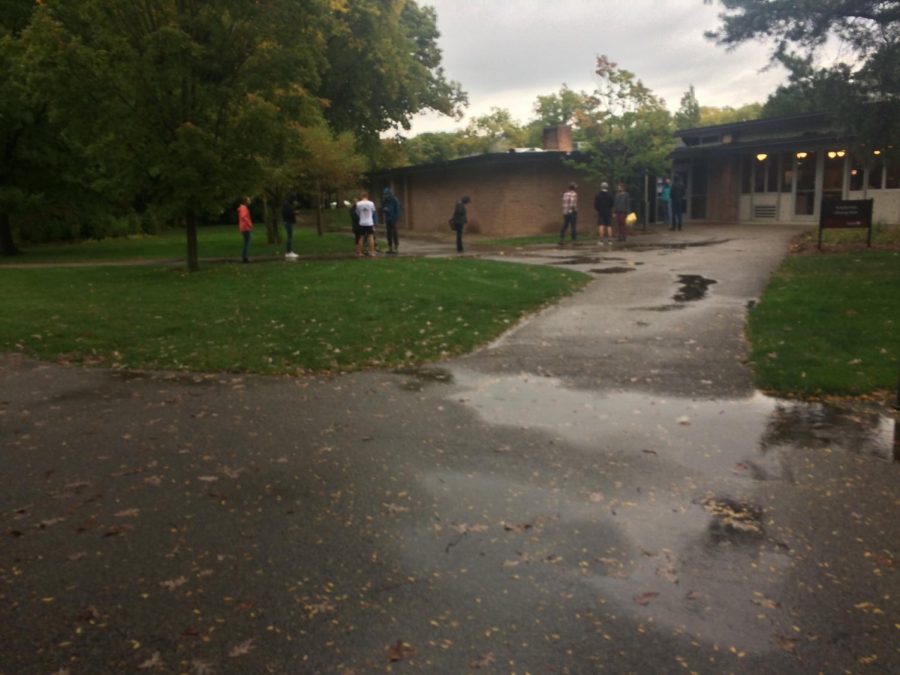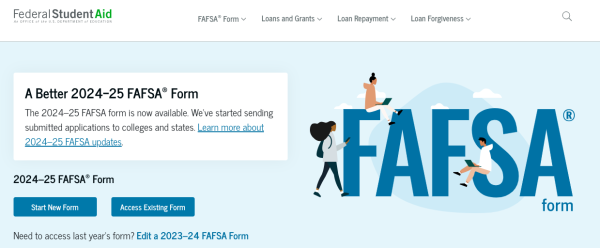Calvin prepares for handling COVID-19 as winter approaches
Students wait in the rain outside Knollcrest Dining Hall.
Calvin’s administration has recently celebrated the school’s handling of COVID-19, announcing on Sept. 30 that no confirmed COVID-19 cases were present on campus. To reach this point, Calvin has encouraged groups of students on campus to stay outside as much as possible, and the west Michigan September weather has largely cooperated. However, the threat of COVID-19 looms large as colder weather approaches and students and faculty anticipate when outdoor gatherings will no longer be a feasible option on campus.
According to John Witte, Dean of Students and member of the COVID Response Team, Calvin’s response to colder weather is an ongoing process. Although there is not a single plan that addresses the issue, Witte said the COVID Response Team talks about it every time they meet, which is once a week. “We are always asking, ‘What’s the next step?’” he said, referring to several new policies being implemented over the duration of the semester.
One concern with worsening weather is the availability of indoor study spaces. As students’ ability to work outside comfortably declines, they will have to move indoors, leading to a potential decrease in social distancing. Starting this week, more study spaces are set to reopen at Hekman Library as part of its phased reopening plan. The main floor now operates on a first-come-first-serve basis and the third floor has reservable seating. Depending on how well students can maintain social distancing and mask-wearing on the third floor, the fifth floor may open in the next few weeks as well.
In addition to the library, there are several other study spaces available, like the drop-in study rooms in Hiemenga Hall. Witte said he’d be happy to open more of those rooms if necessary. He also noted that students are becoming more creative, finding “nooks and crannies” that they normally wouldn’t use to study. Additionally, he’s observed that off-campus students are staying home more, given the lack of activity on campus. This frees up indoor seating that might otherwise be taken.
Colder weather also presents changes in the dining options for students on campus. Without the possibility of eating outside, more stress will be placed on indoor dining locations. With both Knollcrest and Commons dining halls operating with severely limited capacities, this presents a significant challenge for dining services decision-makers.
On top of this, the change in weather might cause significant discomfort for students before they even get their food. Lines leading out the door have persisted at both Commons and Knollcrest, and as temperatures drop, things could get uncomfortable and potentially dangerous for students waiting in line in the Michigan cold.
In response to this, dining services plans to open a taqueria and an American homestyle concept at Knollcrest and Ciao pasta bar and Kimchi’s Indo Asian Cuisine at Commons starting Oct. 12. “By creating four individual concepts with college student comfort food favorites, we are hoping that students will plan better and be flexible about going to a different location if the line is too long at another,” said Scott VanDeraa, director of hospitality operations.
Additionally, the sack breakfast and lunch program relaunched this week, providing an alternative to waiting in line for hot food.
As far as indoor seating goes, dining services is limited by Michigan Department of Health and Human Services restrictions, but VanDeraa noted that new eating areas have recently opened up in Johnny’s, Hiemenga Hall, Spoelhof Center, and Prince Conference Center.
According to student body President Claire Murashima, Student Senate “has not had a role in developing indoor spaces.” She noted that representatives would be happy to address the issue further “if students are still unsatisfied with the amount of indoor eating and study spaces after these are made public…. We’re always trying to identify pain points in the student experience and address them punctually alongside college administrators and other departments so we’ll keep our finger on the pulse of the student body regarding this topic.”
Vice President of Representation Omari Nyarko is interested to see how the administration “uses their creativity to socially distance people indoors,” but he’s impressed with their performance up to this point, which he described as “nothing short of excellent.” For their part, he said students “have gotten into the habit of doing the right thing” when it comes to following regulations.
National concerns about the possibility of a second wave of COVID-19 when traditional flu season hits are relevant to the Calvin conversation as well. During flu season, students could have trouble distinguishing the flu or similar illnesses from COVID-19, adding another layer of confusion to a situation with an already tough-to-identify virus.
“I hope that with flu shots, masks, and much better awareness of hand sanitation, flu season will be less of an issue,” Witte said, “But indeed, we could have students showing symptoms that are not clear until testing is done. Ultimately, it won’t change our practices much, and we will be cautious with students showing symptoms.”
The Calvin administration is feeling “realistically hopeful” heading into the colder seasons, said Witte. While he noted that COVID cases are hard to predict, pointing even to Calvin’s surprising success thus far, Witte stated that he expects on-campus activities to continue smoothly in the upcoming months. “I don’t see this huge spiking problem,” he said. Reflecting on the first half of the semester, Witte said he’s feeling “immense gratitude for the way the majority of folks in the community have stepped up.” If all goes according to plan, the rest of the semester will be just as successful.









Will • Oct 26, 2020 at 8:49 pm
Great piece!
Shelby • Oct 14, 2020 at 1:50 pm
Great piece!